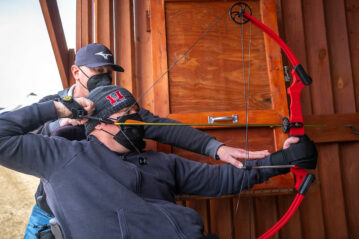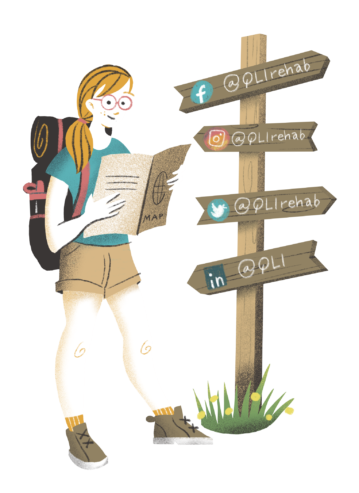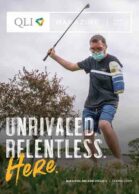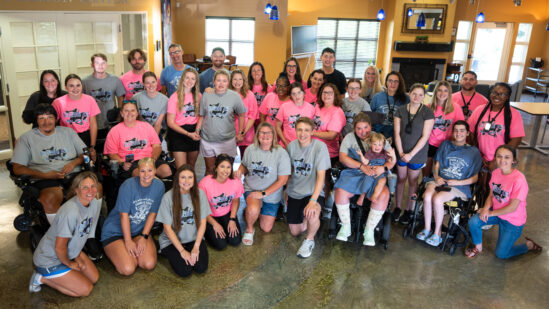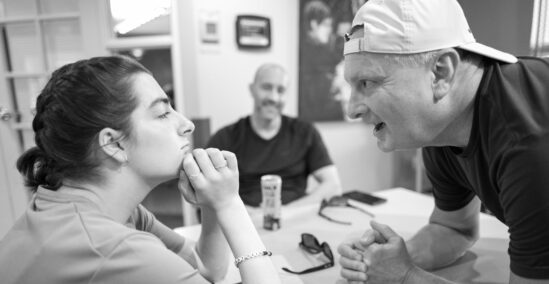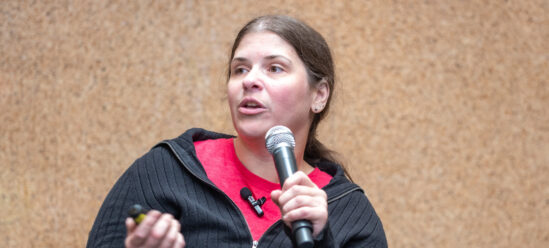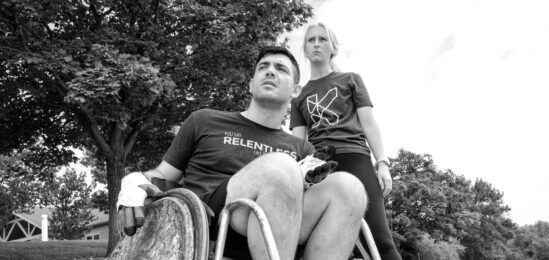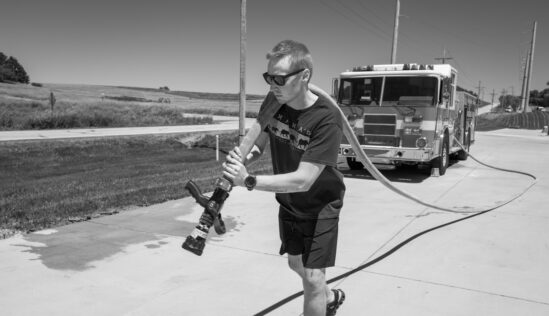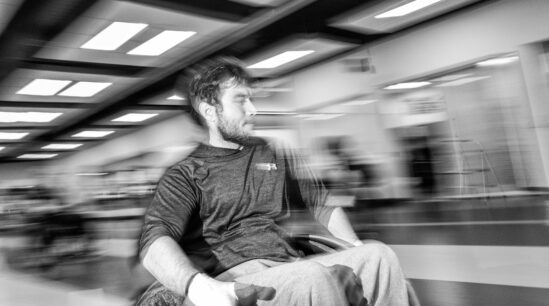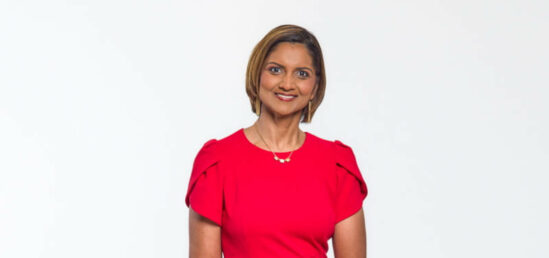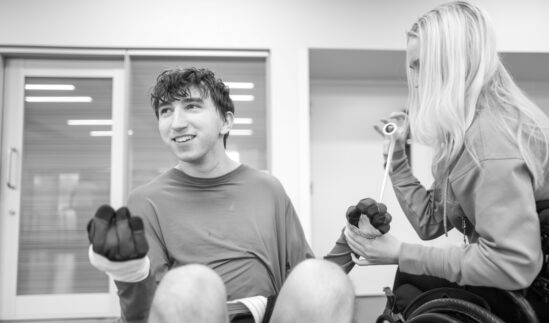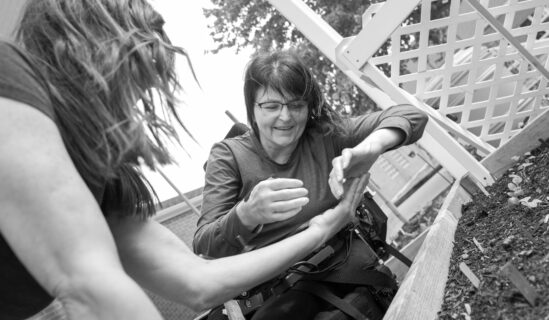Certain setbacks in life can feel insurmountable. Some might truly be minor inconveniences, like misplacing your car keys.
Others define the rest of your life.
When facing unexpected challenges, some succumb to a feeling of powerlessness and lose hope. Others rise in the face of adversity, ready to fight.
Don Tohm and his family are fighters.
…
On Memorial Day in 2020, Don and his family decided to go for a swim in their pool. Don wanted to show his nephew how to make the largest splash possible, and he leaped into the water. His wife Kara was already in the pool. She heard the splash and quickly turned around. Don’s head was submerged—he was paddling awkwardly.
“For a split second I thought he was messing with the kids,” says Kara. “But then I knew something was wrong.”
Kara swam to Don’s side and lifted his head. “Are you okay?” she asked.
Don was able to get out three words: “I need help.”
…
The Tohms are a family of five that leave an impression—one of strong work ethic and devotion to family.
Prior to his injury, Don worked 12-hour days, five to seven days a week at the Waupaca Foundry. Kara worked full time as the Human Resources and Accounting Manager for a local horse trailer company. The Tohms put in long hours so the whole family could experience all life has to offer together. They threw the football around, planned family deer hunting trips, played video games and spent hours a day taking their kids to a myriad of sports practices.
Their connectedness runs deep.
After that Memorial Day, the Tohms now faced multiple, seemingly overwhelming barriers.
Don’s quadriplegic injury occurred during the throes of the COVID-19 pandemic. Hospitals were full and the world shut down.
From their remote location in Manawa, Wisconsin, resources for rehabilitation were scarce. He was in the hospital just a few weeks. “When Don was moved down to a rehab floor of the hospital,” says Kara, “he was the only spinal cord injury patient. The team, though well-meaning, lacked the expertise to provide specialized therapies and the experience to educate us on his injury.”
Then he was sent home. “Insurance made a small allowance for me to do a little bit of at-home therapies and telerehabilitation,” he says, “but nothing really clicked for me. The team support and knowledge I 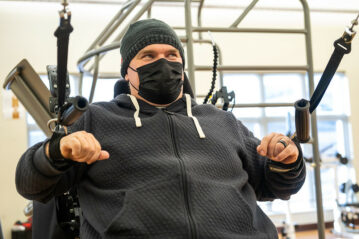 wanted to have was never there.” Kara, despite no experience or training on the complexities of caring for someone with a spinal cord injury, became Don’s full-time caregiver. Every aspect of Don’s care—bed transfers, dressing, toileting, eating—required her assistance.
wanted to have was never there.” Kara, despite no experience or training on the complexities of caring for someone with a spinal cord injury, became Don’s full-time caregiver. Every aspect of Don’s care—bed transfers, dressing, toileting, eating—required her assistance.
Eighteen months came and went. “I stuck it out with insurance,” says Kara. “I heard the word ‘no’ so many times. Why us? Why did we happen to get this unlucky?” But then, after such a long time—a breakthrough.
They collectively refer to it as their “Christmas miracle.” With no justification or explanation from the insurance company, Don was granted an initial three weeks at QLI. The Tohms first heard of QLI in the midst of their insurance struggles, with Kara first catching a link to the QLI website from an advocacy group listing of renowned and recommended facilities.
“When I arrived at QLI, I knew it was different in the best possible way,” says Don. “Before, I’d be the only one around with my type of injury, but at QLI, not only did I have peers with similar injuries, but I had a whole team dedicated to educating me on my cares and guiding me through recovery.”
“Don never got discouraged by adversity, and he has a relentless attitude. If there was a task he was struggling with, he had to keep at it until he succeeded,” says physical therapist Anna Calgaard. “He had a longer period of time between his injury and rehabilitation than other clients. The one upside to this was that he developed a strong problem-solving and independent attitude. He was laser-focused on the work that needed to be done and recognized the opportunity it was to have access to the resources he now had.”
With only a three-week initial approval, Don and his QLI team got to work. The core focus of the program was rebuilding strength. Because of the paralysis, Don’s hands had grown more constricted, meaning that he was not able to properly grasp objects or utilize his hands in the way that he had known all his life. This recovery was first seen in practicing transfers with occupational therapist Morgan Chapman.
After a slide board transfer from his power wheelchair onto a therapy mat, Chapman would assist Don in putting on looped straps, secured around his legs. Don learned to push both of his hands into the straps,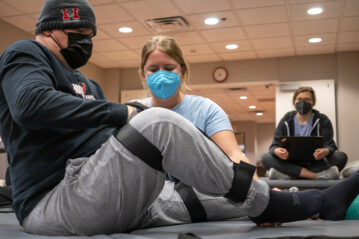 and he would, through utilizing his hands and forearms, move his legs into a comfortable position.
and he would, through utilizing his hands and forearms, move his legs into a comfortable position.
Though Don primarily used a powered wheelchair, it was important to consider any option that may work for his mobility. In his daily sessions with Calgaard, Don practiced circuits and distance runs with a manual wheelchair, building the muscle combinations needed to propel himself independently. These daily challenges built both strength and reliance, translating to all aspects of Don’s life.
The gains he made in therapy were integrated into Don’s hobbies. Though he could no longer track a deer on his feet, Don was able to trial the specialized Action Trackchair to traverse varied terrains. Although he could not rely squarely on his hands to fire his hunting rifle, Coordinator of Adaptive Sports Ed Armstrong introduced a customized grip for Don’s hand that acted as a trigger finger.
The fight the Tohms brought matched with his team’s intense and personalized programming, and resulted in Don’s speedy progress. His insurance company noticed his progress and granted him an additional four months on campus.
Now, in a well-earned retirement, Don, Kara, and their kids look forward to their future. “I know there is still a lot of hard work ahead. But now I have a whole team behind me. Through the therapies I did at QLI and the clinicians I worked with, my time on campus allowed for me to see what I am capable of, and those accomplishments have already aided my recovery, and will continue to aid me for the rest of my life.”
